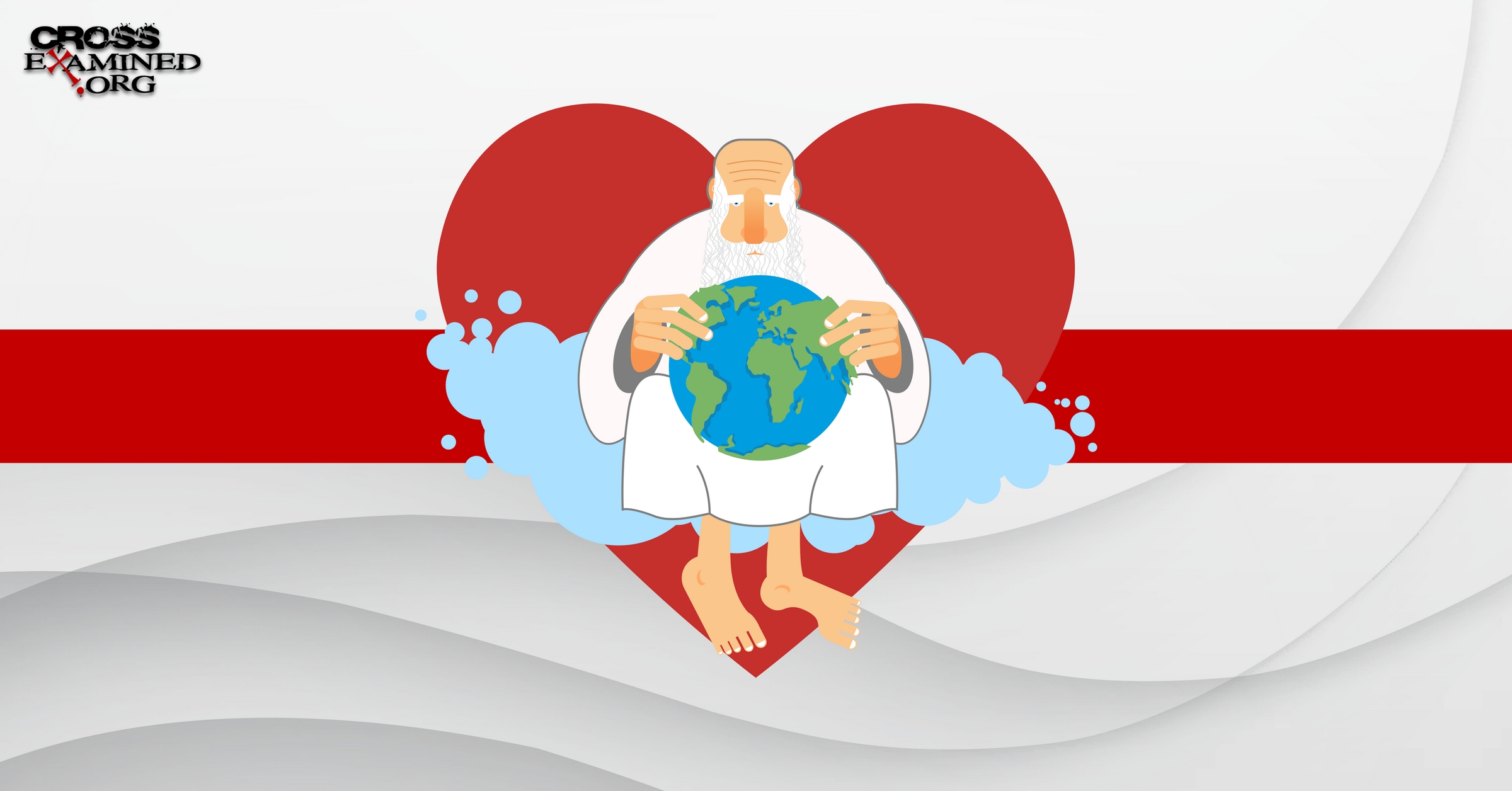By Luke Nix
Introduction
Those who follow this blog are aware that I not only defend “mere” Christianity, but I also defend specifics in the Christian worldview. As I have written before, I believe that if a Christian is defending an incorrect detail of their worldview to a skeptic, that skeptic can easily use that incorrect detail as an excuse to reject the entire worldview (even though this is not logically reasonable). Over the last few years of interacting with fellow Christians regarding the details of our worldview, one of the doctrines that are not discussed explicitly very often, but other debates directly affect, is the doctrine of the Image of God. I have noticed that some positions in the other debates imply different views of the Image of God, and these different views of the Image of God can be used to test the positions in the other debates. But before I get into those debates, we need to know why this Judeo-Christian doctrine is so important in the first place.
What Is At Stake?
The Image of God provides the grounding for several essential characteristics of humans that set us apart from the animal kingdom. Without appropriate grounding for these characteristics, a worldview cannot explain these characteristics, thus it is forced to deny that they even exist…with dire consequences, as we shall see. What are these characteristics, though? While the Image of God grounds several characteristics, I want to examine four of them today:
- Intrinsic Value
- Free Will
- Moral Responsibility
- The Ability to Reason
Intrinsic Value
It is common today to think that a person’s value is based upon their race, sex, age, religion, intelligence, economic status, physical ability, entertainment ability, or a whole host of other “useful” things to a society. All of these, though, are relative and fleeting. Anytime that one of those are different (between persons or even in the same person at different times in their lives) their value goes up, down, or disappears. Intrinsic value is value that is not based on any of those accidental characteristics. Intrinsic value is value that is objective, found outside the societies, groups, or other individuals who are judging a person’s worth. This is an objective value that people possess simply in virtue of being human.
No human is intrinsically more or less valuable than another. This concept provides the ground for the idea of “equal rights” regardless of sex, race, age, ability, or status. If you are a human, you are intrinsically valuable, period. Since animals do not possess the Image of God, they do not possess such intrinsic value; they are valuable based upon whatever someone else needs them to accomplish. Animal value is relative and subjective, but human value is objective. If someone violates (harms) an intrinsically valuable thing, it is a moral evil. Specifically, an attack on a possessor of the Image of God is a direct attack on God Himself. If humans do not possess the Image of God, no act against us for any reason is evil. In fact, if humans do not possess the Image of God, it is permissible (if not obligatory) that humans be treated no different than any other animal (and vice versa). Just as a house fly may be killed because it is irritating us, so may a human be killed because he or she is irritating us, and if a human’s life is to be protected by the law, then so should the life of every animal be protected by the law also.
Free Will
When I say “free will” I am talking about the ability to choose to do something other than what we actually do, given the same circumstances (called “libertarian” free will). For instance, you have a choice to continue reading this post or not. Sure, some things will influence that choice, but ultimately you are choosing whether to accept those influences and act upon them or not; the circumstances (or your desires) do not determine your choice, though they do influence your choice. What allows us to do this is the fact that we are “agents” or “souls.” These (and we) are beings that exist independent of physical reality, thus we are not 100% governed by its laws (though our bodies are, which many of our decisions require us to take into account). Because an agent is not physical, it must have a non-physical source- the Image of God provides that source for humans. If humans do not possess the Image of God, then we do not possess free will and all our “choices” are determined by something else, not us.
The animals do not possess the Image of God, thus they do not possess free will. They are beholden to their environment for their behavior. Their surroundings are what determine how they act. The fact that humans have free will means that humans are capable of choosing how to act towards one another, nothing or no one else makes the choice for us, we are responsible.
Moral Responsibility
Taking the two previous characteristics provided by the Image of God, we discover that humans have moral responsibility. If humans are not intrinsically valuable, then no act committed against them is evil. If humans do not have the ability to choose to do otherwise, then they cannot be held responsible for such an evil act. Thus both intrinsic value AND free will are necessary for moral responsibility. This makes us moral beings. Something that animals are not. If an animal kills another animal, we do not call it “murder” because “murder” is “killing” plus a moral element. Animals do not possess intrinsic value (so the killing is not a violation of God’s Image) and animals are not morally responsible beings. On the other hand, man is both intrinsically valuable AND a moral being, so if a human kills another human it is a moral act based on the Image of God in both the victim and the killer. And the morality of that act must be justified by the Moral Law that God has written on the hearts of every human (via His Image) and in His further revelation of Scripture.
This means that if humans wish to hold other humans morally responsible for their actions, the Image of God is necessary on two accounts. Without the Image of God, there is no ground for moral responsibility, no ground for reward or punishment. In fact, if either intrinsic value or free will are missing from the equation, moral responsibility (and reward and punishment) cannot do not make sense; they are meaningless.
The Ability to Reason
Often times it is difficult to distinguish between what is true and what is practical because the two do not always seem to align. What is practical is derived from what allows us to survive and thrive in any given environment. We act and react, according to what stimulates our senses, with those two purposes as the end goal. This is the mode of operation of a creature that not only does not possess free will but also one that does not possess reliable reasoning faculties. If our ability to reason is grounded in a process or object that is focused on survival, then that is exactly what it will do, and the misalignments between what is practical and what is true will never be detected. We are forced to conflate truth with practicality, on this view, because as the environment changes, what is necessary for survival also changes (think of living in Saudi Arabia vs. living in the United States).
On the other hand, if our reasoning faculties are grounded in something that is essentially concerned with what is true, then that faculty can be trusted to be able to detect the difference between a belief that is merely practical for an environment and one that is true (independent of the environment). The Image of God provides this grounding in the Creator, who IS omniscient and desires that humans come to know what is true and not just what is practical for their given environment. In being made in the Image of God, humans not only possess the ability to freely choose among options, we have a reliable tool to identify which option is the correct option. Thus this makes our moral responsibility even more binding.*
The Origin and Current Status of the Image of God
Because all four of those characteristics are tied to the Image of God, it is important that in our defense of the Christian worldview, and specifics within the worldview, that we consistently hold and defend a specific view regarding its origin and status.
Testing Origins Views Via The Image of God
Regarding its origin, some people believe that the Image of God came about by natural processes- it is a functional distinction between us and the animals based upon our evolution from the lower species. This view is most commonly found in the origin position called “theistic evolution” or “evolutionary creationism” (but not all of them hold this view of the Image of God; I’ll address that important distinction in a minute). This cannot be the way the Image of God appeared because it is merely a difference in degree of development between animal and human rather than a difference in ontological essence (“kind”). A difference in degree is not an ontological difference, but the Image of God, in order to be an ontological ground for the four characteristics I described above (and the many others I didn’t), must be an ontological difference. If one holds that the Image of God is not a difference in kind, then all the implications of the above-described characteristics’ absences are actually the reality- human intrinsic value does not exist, free will does not exist, moral responsibility does not exist, and the ability to reason does not exist.
While I do not defend common descent of humans with any animal (I’m not an evolutionary creationist), I must understand that not every evolutionary creationist holds to this view of the Image of God because of its dire philosophical and theological (biblical) implications. These theistic evolutionists hold, just as much as any creationist (young-earth or old-earth), that the Image of God appeared suddenly in history (as a special creative work of God) and that sudden appearance is evident in the fossil and archaeological record.
Where things get difficult, though, is that many naturalists insist that all features of humans appear gradually in the fossil and archaeological records. If that is true, then even the Image of God appears gradually. That would imply that the Image of God is merely a difference in degree and not in kind. So, if a Christian theistic evolutionist wishes to maintain common descent of humans with prior animals (and they wish to avoid the implications of merely a functional Image of God), then they must reject the interpretation of the historical records that naturalists offer regarding the Image’s features appearing gradually (descending from “lower” species).
What is really interesting is that the more that the data is reinterpreted to be consistent with an ontological Image of God (a sudden appearance), the more the line is blurred for the theistic evolutionist between the sudden appearance of the Image of God and the sudden appearance of humans. Perhaps a persuasive case for the rejection of common descent between humans and animals (and the acceptance of humans as a special creation of God independent of His other creations) is found in our defense of the proper view of the Image of God and its endowments (e.g. intrinsic value, free will, moral responsibility, and the ability to reason) upon humans. Our maintaining the proper view of the Image of God helps us to test and guide our view of human origins. If this has intrigued you, I highly recommend reading the book “Who Was Adam” by biochemist Dr. Fazale Rana to see the scientific evidence for the sudden appearance of the Image of God (and humans) in the scientific record.
One More Thing- Abortion and Active Euthanasia
Before I leave the origins debate, though, I do want to bring up one more implication for holding that the Image of God is merely a difference in the degree of development. If you are familiar with some of the more common defenses for abortion, you will know that one of the reasons offered to deny the unborn intrinsic value (and the intrinsic right to life) is the degree of their development. (Now, I have to be extremely careful not to equivocate on the term “degree of development,” because if the terms do mean the same thing in both the common descent view and the abortion view, then we have a serious problem.) Simply put, the argument for abortion from the degree of development points to the lack of certain features in the unborn that a fully developed human being possesses. The pro-abortion advocate uses this lack of development to conclude that the unborn are not really human, thus do not possess intrinsic value (which means that killing the unborn is perfectly acceptable).
In the book “The Case For Life,” pro-life apologist Scott Klusendorf points out that the “degree of development” argument, applied consistently, also removes intrinsic value (thus justifies intentionally killing) from those living with health issues, including physical handicaps, degenerative diseases, mental disorders and others. If the Image of God is merely a matter of degree of development, then any human who manifests cognitive, creative, or physical limitations akin to those of our pre-human ancestors (on the theistic evolutionary view), they too necessarily lack the Image of God. This would include the unborn (abortion would be morally permissible) and the born (active euthanasia would be morally permissible).
This is one more way that we can use the proper view of the Image of God to test our view of human origins. Unfortunately, it can also be used in the opposite direction to justify abortion and active euthanasia- which is one more reason why maintaining the proper view of the Image of God is so important. We must hold to the proper view of the Image of God to guard against such logically fallacious and morally reprehensible (sinful) views from entering our worldview (even if we insist on maintaining the belief in the common descent of the physical human body).
Testing The Current Status of the Image of God
In the on-going debate about how God’s sovereignty and man’s free will work together, some Christians have opted to deny that man has free will at all by positing that the Image of God was destroyed at the Fall of Adam and Eve. However, when the implications I described above are explained, the Christian usually quickly changes their position, but in many cases the change holds that the Image of God was damaged specifically in a way to destroy human free will but maintain the other traits. While this may seem like an acceptable position, it poses a severe problem.
If intrinsic value does exist, but free will does not, then punishment is a moral evil because it is a violation of (attack against) the intrinsically valuable human, created in the Image of God, who did not have a choice to not commit the crime against another intrinsically valuable human, created in the Image of God. This means that if free will does not exist, God’s punishment of those who commit sin is His attacking Himself- a moral evil. However, we know from the Bible that God cannot sin, that He cannot deny Himself, that a house brought against itself cannot stand, and that God does punish the wicked. If a Christian is to maintain the doctrine of eternal conscious punishment (or even the heterodox view of annihilationism), yet deny free will, then they are saying that God is sinning in virtue of His immoral attack against a creature created in His Image.
Some have attempted to say that God can do whatever He wants. However, this then enters into the debate about God and morality. A common objection to God’s existence comes in the form of the Euthyphro dilemma. This poses the question, “Is God good because He says what is good, or because He is subject to good.” The dilemma is that if the first option is selected then morality is subjective and arbitrary (not objective) because God could simply change His mind about what is good, while if the second option is selected then God is not the highest being, thus He cannot be God. If it is not obvious, the attempted escape from the implication of denying free will but affirming intrinsic value fails because it is the first option of the dilemma- morality is then arbitrary and subjective, thus there is no objective standard by which God can judge, which adds another level of problems because without objective morality, nothing is evil, even an act that attacks a bearer of the Image of God (so, murder, abortion, rape, and every other “sin” is not objectively evil- it is merely God’s opinion at the moment that they are or are not)- moral responsibility essentially was destroyed if free will was also.
The only way to avoid this implication is to affirm that man’s free will is still intact regardless of how we view the effects of the Fall of Adam and Eve. Because of that, we can use the proper view of the current status of the Image of God (intact) to test our views regarding the coexistence of God’s sovereignty and man’s free will.
Conclusion
The Image of God is an important doctrine of Christianity. It provides the ontological grounding for intrinsic value, free will, moral responsibility, and the ability to reason. Without these characteristics in place in humans, Christianity is, at worst, false, and at best unknowable and indefensible. So, it is important that as we defend the truth of the Christian worldview that we do not also defend a scientific or theological position that either asserts or implies that the Image of God is not ontological or was damaged in a way to destroy free will. If we do, then we are defending contradictory claims, and the unbeliever can use that as a reason (because they are made in the Image of God) to freely choose to reject the truth of the Christian worldview.
Recommended Books for More on this Topic
*Of course, mere observation of reality and reason do not always lead to the correct conclusion. The Image of God also provides the Moral Law that is written on all humans’ hearts (since all humans are made in the Image of God). Further, God has given us His special revelation that gives us explicit moral codes. But He did not just give us a book without establishing that it was divinely inspired by the Source of the Image of God. The Bible contains numerous claims about reality, and especially history when no human was present to observe the events (thus eliminating any reasonable natural explanation [e.g. that the author saw it or guessed it). Dr. Hugh Ross explains these in his numerous books on the scientific evidence for the inspiration and authority of the Bible. So, there are two additional tools that solidify man’s moral responsibility and the fact that all men “are without excuse” (Romans 1:20).
Original Blog Source: http://bit.ly/2q1OxlG











